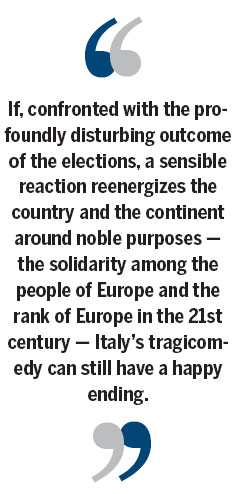Time to push for new policy
Updated: 2013-03-01 09:15
By David Gosset (China Daily)
|
|||||||||||

New Italian leadership faces a tough balancing act
More than once, Italy's trends have prefigured larger European dynamics, for the best, the Renaissance; but also for the worst, Mussolini's fascism, and, by putting a finger on the Italian peninsula one often feels the pulse of a continent.
The outcome of the election that has determined the composition of the 17th Parliament of the Italian Republic reveals a profoundly fragmented country that, in the midst of a world of changes, questions the European Union's orientations.
In the most recent elections in Catalonia and in the Netherlands, despite nationalistic temptations, the majority considered that their union had become the necessary instrument to maintain the political relevance of the old continent. However, anti-European sentiment dominated the vote in Italy, a founding member of the European Community, the country of European patriots like De Gasperi, Ciampi or Romano Prodi.
The Europhile Pier Luigi Bersani was unable to achieve a convincing win, while the incumbent prime minister and former European Union official Mario Monti underperformed. By contrast, the Eurosceptic forces showed vitality, and not only did Italy give another life to the demagoguery of Silvio Berlusconi but it even applauded Beppe Grillo's populistic circus.
This is a worrying moment for Italy and sad news for the continent: showmanship attracted more than soberness, parochial entertainment more than European commitment.
However, Italy and the EU, not a sum of national egoisms, have the resources to face a crisis that will have far-reaching consequences.
With the third-biggest economy in the eurozone, and the eighth biggest worldwide, and slightly larger than that of Russia last year, Italy, a member of the G8 and a cultural superpower, remains a significant player in world affairs.
Obviously, the next Italian government will face daunting domestic challenges: the country's public debt stands at 126 percent of GDP, economic output is now 7 percent below its 2007 pre-crisis level, unemployment is high - 37 percent youth unemployment - and a socio-economic gap between the North and the South divides a country whose centrifugal forces have always been a threat to unity.
However, investors, media and chancelleries should not underestimate Italy's strengths: many of the medium-sized, family-run Italian companies are genuine poles of excellence with largely positive balance sheets, the brand Italia is a universal magnet and the country had a trade surplus of 8.8 billion euros ($11.5 billion) last year.
Italy and Europe share a common destiny; the continent cannot thrive with a languid "Boot" and vice-versa. It is time to push for a different economic policy at the European level, to put the euro area on the path of economic growth.
Facing a Bundestag (lower house) election in September, the German Chancellor, Angela Merkel, will not immediately back initiatives that could ignite substantial economic activities, but with its 188 billion euro trade surplus she must be aware that Berlin has the key to Europe's recovery, the condition for enduring German prosperity.
Europe's leaders, in their quest for growth and jobs, have received strong support from Washington with the announcement by President Barack Obama of negotiations on a free-trade agreement between the world's two largest economies, the US and the EU. Such an agreement would boost GDP on both sides of the Atlantic by up to 2 percentage points and create 2 million jobs.
While the new Italian leader will have many cards in his hands - domestic, European and transatlantic - he will also have to make wise use of the new international configuration to maximize Italian merchants' traditional ability to trade with every corner of the world.
If, confronted with the profoundly disturbing outcome of the elections, a sensible reaction reenergizes the country and the continent around noble purposes - the solidarity among the people of Europe and the rank of Europe in the 21st century - Italy's tragicomedy can still have a happy ending.
The author is director of the Academia Sinica Europaea at China Europe International Business School (CEIBS), Shanghai, Beijing & Accra, and founder of the Euro-China Forum. The views do not necessarily reflect those of China Daily.
(China Daily 03/01/2013 page10)
Today's Top News
List of approved GM food clarified
ID checks for express deliveries in Guangdong
Govt to expand elderly care
University asks freshmen to sign suicide disclaimer
Tibet gears up for new climbing season
Media asked to promote Sino-Indian ties
Shots fired at Washington Navy Yard
Minimum growth rate set at 7%
Hot Topics
Lunar probe , China growth forecasts, Emission rules get tougher, China seen through 'colored lens', International board,
Editor's Picks

|

|

|

|

|

|





